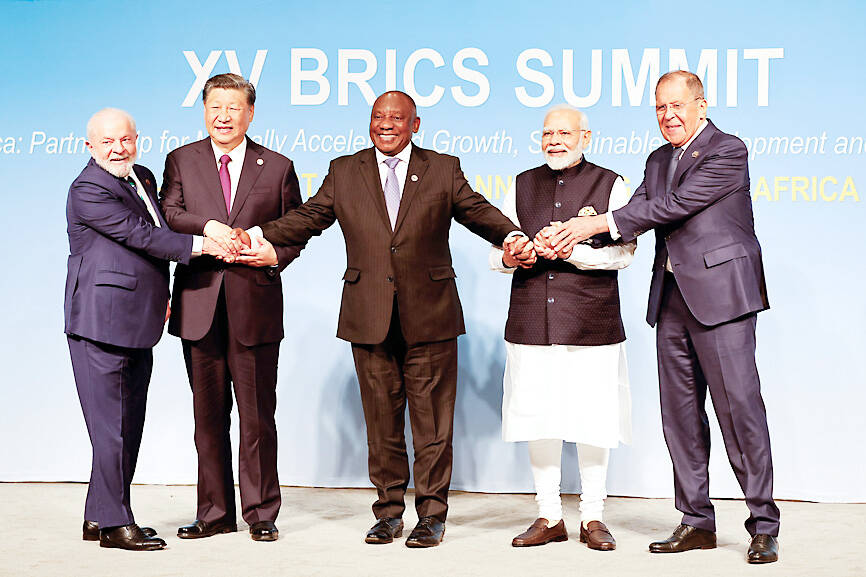Chinese President Xi Jinping (習近平) failed to attend a business forum in South Africa where he was expected to deliver a speech defending China’s economy and its support for emerging markets, as fears mount that the Asian nation’s struggles could cause global turbulence.
According to a public schedule, the Chinese leader was set to address the BRICS Business Forum on Tuesday, after meeting with South African President Cyril Ramaphosa earlier in the day. Instead, delegates were greeted on stage by Chinese Minister of Commerce Wang Wentao (王文濤), who read the speech without giving an explanation for Xi’s absence.
“The Chinese economy has strong resilience, tremendous potential and great vitality. The fundamentals sustaining China’s long-term growth will remain unchanged,” Wang read. “The giant ship of the Chinese economy will continue to cleave waves and sail ahead.”

Photo: AFP
Hours later, Xi attended a dinner with the leaders of South Africa, Brazil and India, and Russia’s foreign minister, who are in Johannesburg for the annual BRICS summit of emerging market powers.
Xi’s decision to skip delivering a bullish economic message in person comes as his nation faces intense global scrutiny over its struggles with falling prices, a faltering property market and soaring local government debt.
As China confronts those concerns, the South Africa summit brings Xi into the orbit of leaders he has not seen in months, including a bilateral meeting with Indian Prime Minister Narendra Modi that is expected to take place on the sidelines of the summit.
Xi’s speech would have been his first public remarks delivered abroad this year. Prior to South Africa, the Chinese leader had spent just two days overseas this year, when he visited Russia.
Chinese-language state media reports yesterday made no mention of his absence, instead saying he delivered the speech without referencing Wang — although Xinhua news agency’s English report said the remarks were read on his behalf.
BRICS leaders yesterday turned to the main business of their summit, debating whether to expand their bloc and allow in new members, after Russian President Vladimir Putin on Tuesday gave the gathering an anti-Western tinge.
Putin is not attending the summit after an International Criminal Court arrest warrant for him over the war in Ukraine complicated his travel to South Africa, but he was participating virtually.
The Russian leader used a 17-minute prerecorded speech aired on the opening day of the summit on Tuesday to lambast the West over the war in Ukraine and the financial sanctions placed on Russia as punishment for its invasion.
He said a critical deal allowing Ukraine to move grain out of its Black Sea ports that Russia halted last month would not be reinstated unless Russian conditions are met.
Additional reporting by AP

AIR SUPPORT: The Ministry of National Defense thanked the US for the delivery, adding that it was an indicator of the White House’s commitment to the Taiwan Relations Act Deputy Minister of National Defense Po Horng-huei (柏鴻輝) and Representative to the US Alexander Yui on Friday attended a delivery ceremony for the first of Taiwan’s long-awaited 66 F-16C/D Block 70 jets at a Lockheed Martin Corp factory in Greenville, South Carolina. “We are so proud to be the global home of the F-16 and to support Taiwan’s air defense capabilities,” US Representative William Timmons wrote on X, alongside a photograph of Taiwanese and US officials at the event. The F-16C/D Block 70 jets Taiwan ordered have the same capabilities as aircraft that had been upgraded to F-16Vs. The batch of Lockheed Martin

GRIDLOCK: The National Fire Agency’s Special Search and Rescue team is on standby to travel to the countries to help out with the rescue effort A powerful earthquake rocked Myanmar and neighboring Thailand yesterday, killing at least three people in Bangkok and burying dozens when a high-rise building under construction collapsed. Footage shared on social media from Myanmar’s second-largest city showed widespread destruction, raising fears that many were trapped under the rubble or killed. The magnitude 7.7 earthquake, with an epicenter near Mandalay in Myanmar, struck at midday and was followed by a strong magnitude 6.4 aftershock. The extent of death, injury and destruction — especially in Myanmar, which is embroiled in a civil war and where information is tightly controlled at the best of times —

Taiwan was ranked the fourth-safest country in the world with a score of 82.9, trailing only Andorra, the United Arab Emirates and Qatar in Numbeo’s Safety Index by Country report. Taiwan’s score improved by 0.1 points compared with last year’s mid-year report, which had Taiwan fourth with a score of 82.8. However, both scores were lower than in last year’s first review, when Taiwan scored 83.3, and are a long way from when Taiwan was named the second-safest country in the world in 2021, scoring 84.8. Taiwan ranked higher than Singapore in ninth with a score of 77.4 and Japan in 10th with

SECURITY RISK: If there is a conflict between China and Taiwan, ‘there would likely be significant consequences to global economic and security interests,’ it said China remains the top military and cyber threat to the US and continues to make progress on capabilities to seize Taiwan, a report by US intelligence agencies said on Tuesday. The report provides an overview of the “collective insights” of top US intelligence agencies about the security threats to the US posed by foreign nations and criminal organizations. In its Annual Threat Assessment, the agencies divided threats facing the US into two broad categories, “nonstate transnational criminals and terrorists” and “major state actors,” with China, Russia, Iran and North Korea named. Of those countries, “China presents the most comprehensive and robust military threat